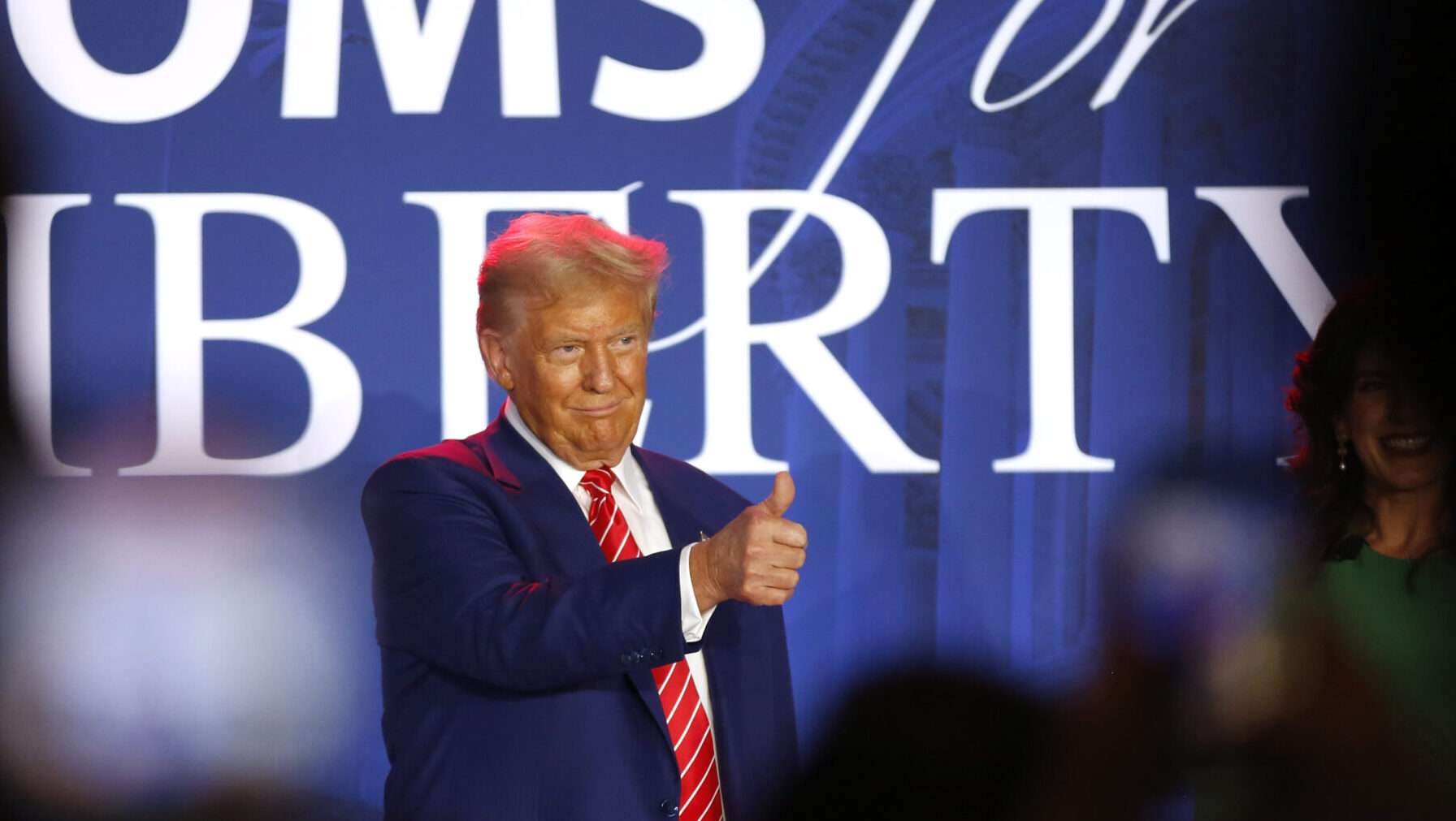By now, most of us who pay attention to politics have become accustomed to tuning out the word-salad responses that former President Donald Trump frequently offers when asked a specific, policy-oriented question. But even by Trump’s standards, the answer he gave on Thursday when asked to explain how he’d propose to lower child care costs was a doozy. “It’s a very important issue. But I think when you talk about the kind of numbers that I’m talking about—that, because, look, child care is child care—you know, there’s something you have to have it in this country. You have to have it,” Trump began. “But when you talk about those numbers, compared to the kind of numbers that I’m talking about by taxing foreign nations at levels that they’re not used to—but they’ll get used to it very quickly—and it’s not going to stop them from doing business with us.” It goes on from there. If you’re being very generous to Trump, you might conclude that he’s proposing to use tariff revenue to cover child care costs—though it’s not clear how much he’d spend or what the mechanism for redistributing that money would be. In short, what it seems Trump is promising here is a huge expansion of taxes on Americans to somehow pay for child care costs: growing government on the revenue side to pay for an expansion of government on the spending side. Of course, it’s hard to tell exactly what he was saying there, so let’s not get bogged down in the specifics. Trump certainty isn’t. It may be tempting to simply write this off as “Trump being Trump” and move on. But the Republican presidential nominee’s consistent inattention to the details of policymaking does matter—even if it has no bearing on the election—and the child care issue is a perfect example of why. This sort of issue is a liability for Trump because he can’t just bluster or pander his way through it. Trump excels when he can turn complex policies into simple, partisan us-vs.-them arguments that allow him to avoid any attention on the specifics. On issues like taxes and immigration, this technique works because one party broadly wants the policy to shift in one direction, so Trump can simply promise to do the opposite—never mind the details. But no one wants higher child care costs. Both sides want to reduce them. The argument, then, must turn on which side can offer the better plan for accomplishing that goal. As Thursday’s answer makes obvious, Trump has no such plan. That’s a problem because Vice President Kamala Harris can offer at least the semblance of a plan—and it’s a bad one. Harris has “signaled that she plans to build on the ambitions of outgoing President Joe Biden’s administration, which sought to pour billions in taxpayer dollars into making child care and home care for elderly and disabled adults more affordable,” the Associated Press summarized last month. Harris has not offered sufficient policy details to say exactly what she supports, but Biden’s plan mostly involved throwing more money at child care providers. In a supplemental budget request last year, for example, Biden asked Congress to approve $16 billion in additional subsidies for child care. Both Biden and Harris also support an expansion of the child tax credit—which many parents would presumably use to pay for rising child care costs. There are a number of alternatives that a conservative presidential candidate could discuss—even if many of them depend on state and local policymakers. Ease zoning laws to allow more child care facilities to open. Eliminate foolish barriers to entry like occupational licensing laws or requirements that child care providers have college degrees. Loosen rules that require certain staff-to-child ratios. The goal of those proposals is to increase the supply of child care, which is what the country actually needs. At the very least, a more capable candidate would explain why subsidizing demand—by redistributing more money into parents’ pockets or having taxpayers prop up providers—is a terrible way to reduce costs. Just look at what decades of similar federal subsidies have done to the cost of college! Why would you want to repeat that mistake? But the Republican Party does not have a candidate capable of or interested in making that argument. And if the Republican presidential candidate can’t articulate supply-side alternatives and a rhetorical counterweight to costly, counterproductive Democratic proposals, then what good is he? Again, Trump’s inability to discuss child care policy in a serious way may not affect the outcome of the election. Certainly, his lack of policy specifics did not hinder him from winning in 2016. In the bigger picture, however, this matters. Millions of Americans are worried about soaring child care costs. For the next two months, they will hear lots of bad ideas from Harris’ campaign about how to allegedly fix those problems. Many won’t seek out alternatives, and they will come away from this election cycle with the idea that more subsidies and more spending are the only things that can be done, and the question is which party will be more effective at delivering those things. As a result, child care costs will continue to rise, the government will get more expensive, and the efforts to solve both those problems will face a steeper climb.
Source link
Why Trump’s Child Care Policy Incoherence Matters

Leave a comment



